How Long Has Jim Kelly Been on a Feeding Tube
"What do I think of Andrew Luck retiring? I think… I think it's sad to see such great talent go, but there comes a time when you have to man up to your own body. You have to know when it's time to hang it up."
It's been 23 years since pro football Hall of Famer Jim Kelly, now 59, "hung it up" himself, retiring from the National Football League (NFL) after 11 seasons with the Buffalo Bills. He can relate to the Indianapolis Colts' quarterback Andrew Luck's recent retirement, he tells SurvivorNet, nodding his head knowingly at the mention of Luck's continuous cycle of injuries and recoveries that precipitated his retirement. For "Buffalo Bills Kelly," a man who built his life and reputation around being "Kelly Tough," admitting his limits and stepping down from the game he loved in 1996 was, at the time, one of the most difficult challenges he'd ever faced.
But in the years that followed his retirement, Jim Kelly would encounter a series of challenges far greater than football. He would go on to lose his eight-year-old son, Hunter, to a rare genetic disease, then face down three bouts of squamous cell carcinoma of the upper jaw. Through devastating loss followed by all that came along with cancer—including chemotherapy, radiation, and multiple intensive surgeries—the legendary quarterback would come to give "Kelly Tough" a new meaning.
"Kellys Are Huggers"
Kelly recently took the stage at an event sponsored by the pharmaceutical company Merck called, "With Love, Me." He straightened his Hall of Famer tie as he took a seat on a panel with five other remarkable cancer survivors and caregivers. He'd just read aloud a letter addressed to his newly-diagnosed self six years ago, in which he tells himself that the challenges ahead won't be easy, but that he'd get through it with the help of his four "Fs": Faith, Family, Friends, and Fans.

One-by-one, Kelly and the rest of the panel took questions from an audience of people who were going through—or had gone through—cancer, too.
One response showcased the purest version of Jim Kelly—and the reason, perhaps, that he is so universally loved, beyond Buffalo, beyond Western New York, and beyond football altogether.
It came after a woman walked up to a standing microphone in the middle of the audience that sat in a mid-sized venue in downtown Manhattan. The woman, whose complexion was slightly red and irritated on the right side of her face, began speaking softly into the microphone.
"I wasn't going to share this, because it's really hard for me," she began. "But… I am going through radiation right now, and even though my family tells me I look beautiful and the doctors say they're proud of me, I look in the mirror, and it's just not me."
The woman's voice began to quiver as she continued, "My question is… how do you feel 'it's still me?'" She began to sob into the microphone, and as she did, Jim Kelly, who sat on an elevated stage more than 20 feet away from the microphone, stood up, descended from the stage, and traveled to her side with the speed of a former champion football quarterback. When he arrived at the spot where she stood alone, still sobbing, Kelly extended his six-foot-two wingspan and embraced the woman with a bear hug that concealed the entirety of her small frame. Her sobs stifled.
"Kellys are huggers," Kelly said. "And to answer your question, you are beautiful. Don't let anyone ever tell you otherwise."
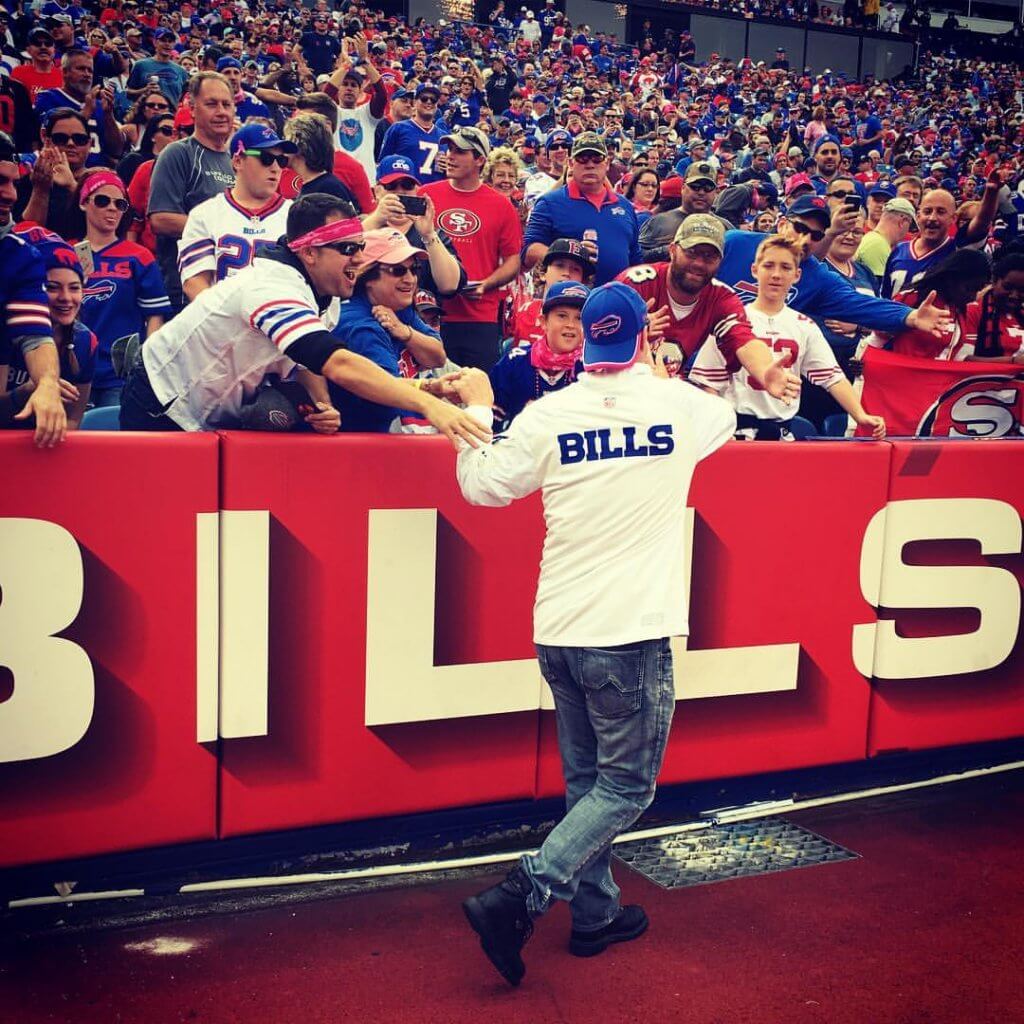
***
"I often put my foot in my mouth, but I never thought I'd put my whole leg in my mouth!"
Kelly delivers his joke with a grin that spans the width of his entire jaw—a jaw that was nonexistent a year and a half ago, and a jaw that is now, he tells SurvivorNet, made from what used to be his own leg bone. In late March 2018, surgeons spent 12 hours removing a cancerous tumor from Kelly's jaw, then extracting his fibula (one of two bones in the lower leg) and using that bone and surrounding tissue and nerve endings to create a brand-new upper jaw.
The six-foot-two NFL Hall of Famer's complicated jaw surgery is only the most recent hurdle in a health journey that began in 2013, when he was first diagnosed with squamous cell carcinoma in his upper jaw. Squamous cell carcinoma is one of the most common types of head and neck cancers, but usually, it develops in smokers, tobacco chewers, and heavy drinkers—none of which applied to Jim Kelly.
After his diagnosis in 2013, Kelly's cancer was surgically removed. It then returned in 2014, at which time Kelly underwent chemotherapy and radiation. The treatment left him cancer-free until March 2018, when his cancer returned yet again. That's when Kelly "put his leg in his mouth," as he now likes to joke—and he's been cancer-free since.
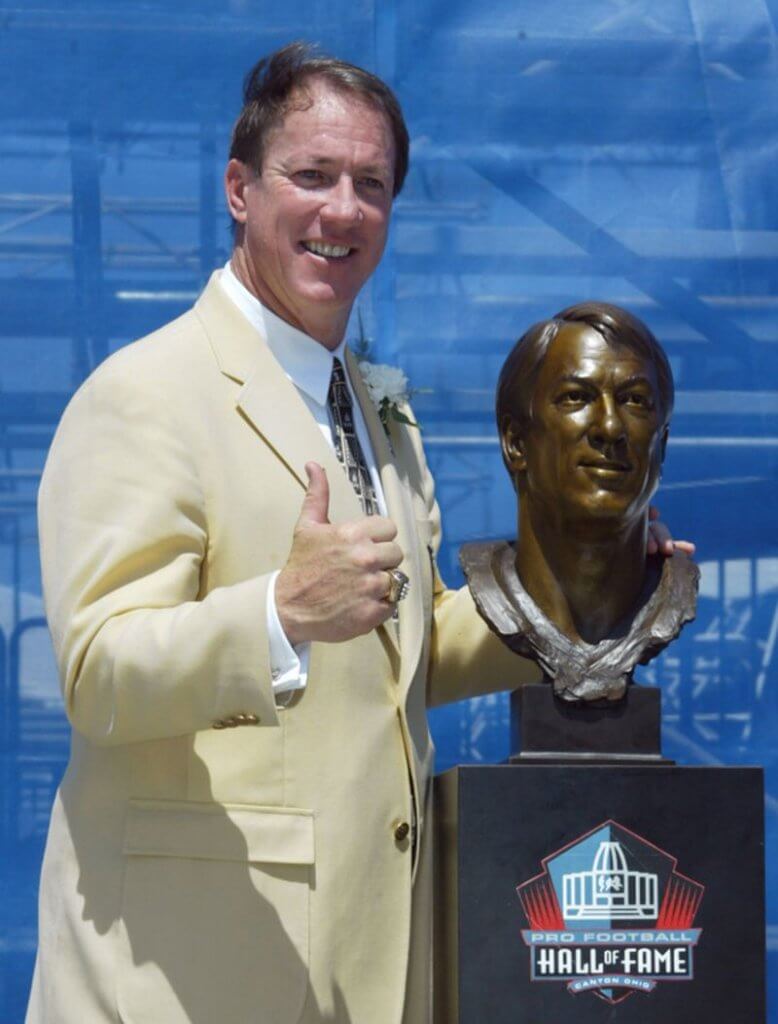
A year and a half have passed since the surgery, and as Kelly swipes through old post-surgery photos on his phone using a finger encircled with a luminous Hall-of-Famer ring, his own fixation makes clear that he is still in awe at what the doctors were able to accomplish. The photos are gruesome; Kelly's swollen face is about three times the size of what it is today. If it wasn't for the hallmark glint in his eye, it would be hard to recognize the NFL legend at all. But in less than two years, Kelly has trained his new jaw to eat, laugh, and talk—albeit with a slightly altered voice. Most importantly, he's recovered his ability to smile—something he does often, showcasing a row of shiny new teeth.
It's still painful for Kelly to talk for long periods of time, but he does it anyway. He has a lot to share, and he's never been one to let pain hold him back.
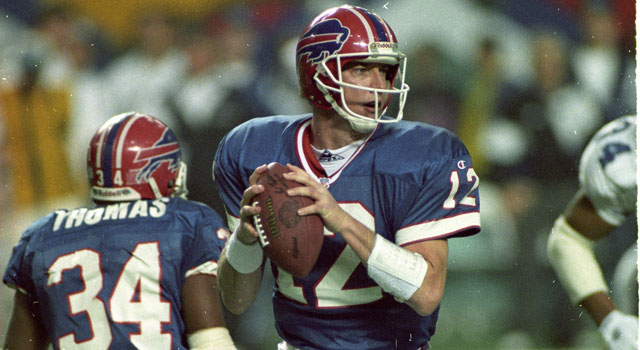
The New Meaning of "Kelly Tough"
As his devoted fans know it, Kelly's story began in 1986, when he joined the Buffalo Bills as quarterback. "Buffalo Bills Kelly" played on the Bills for eleven seasons—the entirety of his NFL career—during which time he led the team to the Super Bowl for four consecutive years. The team lost all four Super Bowls, but the losses seem almost immaterial considering the football records Kelly set—including the second all-time record for most yards gained per completion in a single game, and fifth most completed passes in Super Bowl history. His talent gained him induction into the NFL Hall of Fame in 2002. Today, the name "Jim Kelly" is synonymous to what it means to be from Buffalo. He's a symbol of greatness in all of Western New York—and indeed, the country.
Embed from Getty Images
He's also a symbol of resilience. The adversity Jim Kelly has faced extends beyond beating cancer three times, and beyond training a leg-bone-jaw to smile. In 1997, shortly after retiring from professional football, Kelly's wife, Jill, gave birth to their son, Hunter Kelly. Hunter was born with a rare and fatal genetic disorder called globoid cell leukodystrophy, also called "Krabbe disease," which affects the brain and nervous system. The life expectancy for infants diagnosed with Krabbe disease is roughly 14 months, but Hunter survived eight years, during which he was confined to a wheelchair with a respirator and feeding tube. Kelly devoted himself to caring for Hunter during those eight years, and established a foundation for children with Krabbe disease called Hunter's Hope.
Kelly admits today that his marriage wasn't easy during this time; the stress of providing round-the-clock care for a disabled child—a child who could die any day, according to doctors—at times strained his relationship with Jill. Hunter's death devastated the Kelly family, and in many ways, they are still recovering today. But Kelly also saw a miracle in his son, who far outlived his life expectancy, and became his father's hero.
"It has been written throughout my career that toughness is my trademark," Kelly said in his 2002 Hall of Fame acceptance speech, just three years before his son's death. "Well, the toughest person I've ever met in my life is my hero, my soldier, my son, Hunter. I love you, buddy."
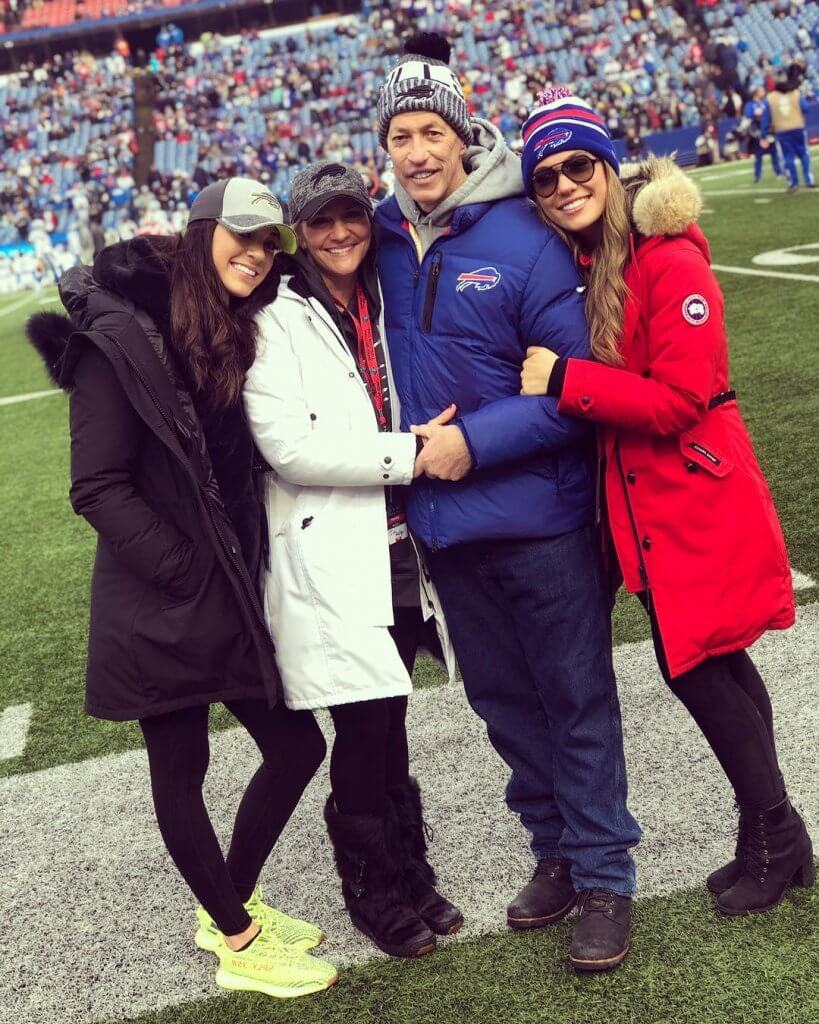
The Four "F's"
Kelly also has two daughters, Erin and Camryn, and the family of four is a support system that Kelly credits today as one of four "F's"—Faith, Family, Friends, and Fans—that have given him the strength to get back up and keep fighting. Kelly's four "Fs" have carried him through both Hunter's death and his three cancer diagnoses. The first F, "faith," is especially crucial for Kelly, a devout Christian who believes strongly that the Lord has a plan for him—and that the countless prayers he's received from his other three "Fs," have been heard.
Caption: Kelly's wife, Jill, and daughters, Erin and Camryn, pray with him in the hospital shortly after his surgery.
"I came around to the sharing… I started to realize, 'if I'm gonna get through this, I'm going to need as many prayers as possible.'"
When he was first diagnosed with cancer back in 2013, Kelly was hesitant about sharing the news. He was a very public figure then—as he still is today—and, having grown up with five brothers, he was raised on "toughness."
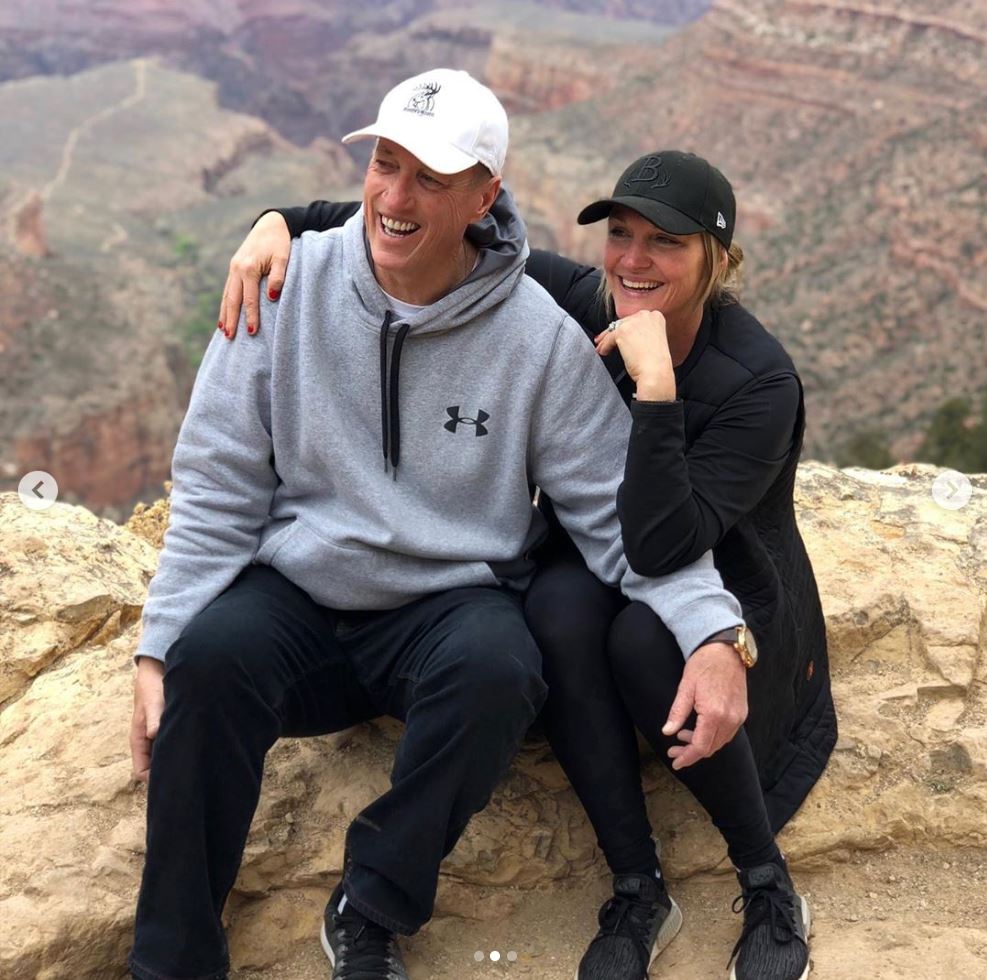
That's why, when his wife, Jill, took to social media to announce the news and ask for prayers, he was initially angry with her. He had wanted to keep this new vulnerability—a vulnerability that caused him to pull over to the side of the road and cry on his drive back from the doctor the day he was diagnosed—private.
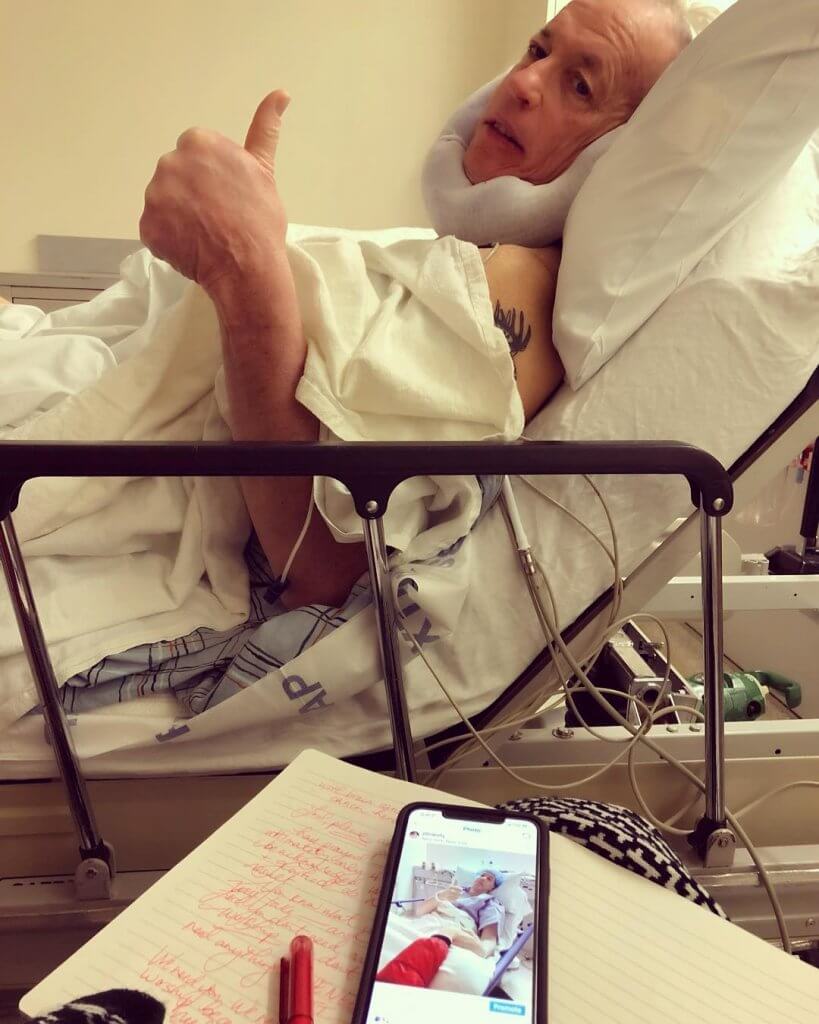
It didn't take long for Kelly to change his mind. The outpouring of prayers he received from fans and friends were energizing; they gave him strength he didn't realize he so desperately needed.
"I had Patriot's fans writing to me, if you can believe that," Kelly remembers. "They wrote me saying, 'you know, I used to hate you, but now I'm praying for you.'"
Embed from Getty Images
Caption: Jim Kelly hugs the New England Patriots' quarterback, Tom Brady, who many consider another "Greatest Of All Time." The two "GOATs" also share the jersey number 12.
As Kelly and his family continued sharing updates about his health, the support multiplied, and so too did Kelly's appreciation.
"I came around to the sharing," Kelly remembers. "I started to realize, 'if I'm gonna get through this, I'm going to need as many prayers as possible."

"Caregivers are t he most important people. Period"
When Kelly was in the hospital at his lowest points—when his face was unrecognizable and he was unable to speak or eat—he says his wife and daughters and wife would enter the hospital room with huge smiles on their faces, bringing with them a burst of positive energy.
"My girls would say, 'Daddy, you look so great today!' even though I definitely didn't. And they'd give me huge hugs," Kelly remembers. "Kellys are huggers."
And Kelly's brothers, he said, would give him the tough love treatment that he needed just as much.
"They'd walk in and say, 'How ya feeling today?' And I would say 'not so good.' And they'd say, 'Get up! We're going for a walk!'"
In his own moments of vulnerability, Kelly says, he saw in his family what he had been on the opposite side of during Hunter's brief life: caregiving.
"Caregivers are the most important people walking around any hospital," Kelly says. "They're the most important people, period."
***
Today, Jim Kelly channels his cancer experience into advocacy, connecting newly diagnosed patients not unlike the way he created Hunter's Hope to connect families dealing with Krabbe disease with the best resources—and with each other.
Kelly is the sponsored spokesperson for "Your Cancer Game Plan," a campaign started by Merck to help people take the right actions after their diagnoses, and to celebrate and support patient advocates—that is, people who devote their lives to helping people with cancer and their loved ones. Kelly says he's seen a big shift since he started his advocacy work, especially in terms of how people access information about their cancer and speak openly about their diagnoses.
"I've always had the attitude of, 'there is a reason for this,'" Kelly says, explaining that what he's been through, coupled with his fame, has given him a platform to help thousands of people. "People used to look at me and know me as a professional football player, but now I am so much happier with what people know me for today: helping people."
When asked if he's ever felt the opposite of "there is a reason for this"—that is, if he's ever asked himself "why me?"—Kelly's jaw breaks out into a grin again.
"I've asked 'why me' a whole lot," he says, still smiling. "Remember… you're looking at a man who went to the Super Bowl four years in a row and didn't win once. I mean, who does that?"

"What do I think of Andrew Luck retiring? I think… I think it's sad to see such great talent go, but there comes a time when you have to man up to your own body. You have to know when it's time to hang it up."
It's been 23 years since pro football Hall of Famer Jim Kelly, now 59, "hung it up" himself, retiring from the National Football League (NFL) after 11 seasons with the Buffalo Bills. He can relate to the Indianapolis Colts' quarterback Andrew Luck's recent retirement, he tells SurvivorNet, nodding his head knowingly at the mention of Luck's continuous cycle of injuries and recoveries that precipitated his retirement. For "Buffalo Bills Kelly," a man who built his life and reputation around being "Kelly Tough," admitting his limits and stepping down from the game he loved in 1996 was, at the time, one of the most difficult challenges he'd ever faced.
Read More
But in the years that followed his retirement, Jim Kelly would encounter a series of challenges far greater than football. He would go on to lose his eight-year-old son, Hunter, to a rare genetic disease, then face down three bouts of squamous cell carcinoma of the upper jaw. Through devastating loss followed by all that came along with cancer—including chemotherapy, radiation, and multiple intensive surgeries—the legendary quarterback would come to give "Kelly Tough" a new meaning.
"Kellys Are Huggers"
Kelly recently took the stage at an event sponsored by the pharmaceutical company Merck called, "With Love, Me." He straightened his Hall of Famer tie as he took a seat on a panel with five other remarkable cancer survivors and caregivers. He'd just read aloud a letter addressed to his newly-diagnosed self six years ago, in which he tells himself that the challenges ahead won't be easy, but that he'd get through it with the help of his four "Fs": Faith, Family, Friends, and Fans.

One-by-one, Kelly and the rest of the panel took questions from an audience of people who were going through—or had gone through—cancer, too.
One response showcased the purest version of Jim Kelly—and the reason, perhaps, that he is so universally loved, beyond Buffalo, beyond Western New York, and beyond football altogether.
It came after a woman walked up to a standing microphone in the middle of the audience that sat in a mid-sized venue in downtown Manhattan. The woman, whose complexion was slightly red and irritated on the right side of her face, began speaking softly into the microphone.
"I wasn't going to share this, because it's really hard for me," she began. "But… I am going through radiation right now, and even though my family tells me I look beautiful and the doctors say they're proud of me, I look in the mirror, and it's just not me."
The woman's voice began to quiver as she continued, "My question is… how do you feel 'it's still me?'" She began to sob into the microphone, and as she did, Jim Kelly, who sat on an elevated stage more than 20 feet away from the microphone, stood up, descended from the stage, and traveled to her side with the speed of a former champion football quarterback. When he arrived at the spot where she stood alone, still sobbing, Kelly extended his six-foot-two wingspan and embraced the woman with a bear hug that concealed the entirety of her small frame. Her sobs stifled.
"Kellys are huggers," Kelly said. "And to answer your question, you are beautiful. Don't let anyone ever tell you otherwise."

***
"I often put my foot in my mouth, but I never thought I'd put my whole leg in my mouth!"
Kelly delivers his joke with a grin that spans the width of his entire jaw—a jaw that was nonexistent a year and a half ago, and a jaw that is now, he tells SurvivorNet, made from what used to be his own leg bone. In late March 2018, surgeons spent 12 hours removing a cancerous tumor from Kelly's jaw, then extracting his fibula (one of two bones in the lower leg) and using that bone and surrounding tissue and nerve endings to create a brand-new upper jaw.
The six-foot-two NFL Hall of Famer's complicated jaw surgery is only the most recent hurdle in a health journey that began in 2013, when he was first diagnosed with squamous cell carcinoma in his upper jaw. Squamous cell carcinoma is one of the most common types of head and neck cancers, but usually, it develops in smokers, tobacco chewers, and heavy drinkers—none of which applied to Jim Kelly.
After his diagnosis in 2013, Kelly's cancer was surgically removed. It then returned in 2014, at which time Kelly underwent chemotherapy and radiation. The treatment left him cancer-free until March 2018, when his cancer returned yet again. That's when Kelly "put his leg in his mouth," as he now likes to joke—and he's been cancer-free since.

A year and a half have passed since the surgery, and as Kelly swipes through old post-surgery photos on his phone using a finger encircled with a luminous Hall-of-Famer ring, his own fixation makes clear that he is still in awe at what the doctors were able to accomplish. The photos are gruesome; Kelly's swollen face is about three times the size of what it is today. If it wasn't for the hallmark glint in his eye, it would be hard to recognize the NFL legend at all. But in less than two years, Kelly has trained his new jaw to eat, laugh, and talk—albeit with a slightly altered voice. Most importantly, he's recovered his ability to smile—something he does often, showcasing a row of shiny new teeth.
It's still painful for Kelly to talk for long periods of time, but he does it anyway. He has a lot to share, and he's never been one to let pain hold him back.

The New Meaning of "Kelly Tough"
As his devoted fans know it, Kelly's story began in 1986, when he joined the Buffalo Bills as quarterback. "Buffalo Bills Kelly" played on the Bills for eleven seasons—the entirety of his NFL career—during which time he led the team to the Super Bowl for four consecutive years. The team lost all four Super Bowls, but the losses seem almost immaterial considering the football records Kelly set—including the second all-time record for most yards gained per completion in a single game, and fifth most completed passes in Super Bowl history. His talent gained him induction into the NFL Hall of Fame in 2002. Today, the name "Jim Kelly" is synonymous to what it means to be from Buffalo. He's a symbol of greatness in all of Western New York—and indeed, the country.
Embed from Getty Images
He's also a symbol of resilience. The adversity Jim Kelly has faced extends beyond beating cancer three times, and beyond training a leg-bone-jaw to smile. In 1997, shortly after retiring from professional football, Kelly's wife, Jill, gave birth to their son, Hunter Kelly. Hunter was born with a rare and fatal genetic disorder called globoid cell leukodystrophy, also called "Krabbe disease," which affects the brain and nervous system. The life expectancy for infants diagnosed with Krabbe disease is roughly 14 months, but Hunter survived eight years, during which he was confined to a wheelchair with a respirator and feeding tube. Kelly devoted himself to caring for Hunter during those eight years, and established a foundation for children with Krabbe disease called Hunter's Hope.
Kelly admits today that his marriage wasn't easy during this time; the stress of providing round-the-clock care for a disabled child—a child who could die any day, according to doctors—at times strained his relationship with Jill. Hunter's death devastated the Kelly family, and in many ways, they are still recovering today. But Kelly also saw a miracle in his son, who far outlived his life expectancy, and became his father's hero.
"It has been written throughout my career that toughness is my trademark," Kelly said in his 2002 Hall of Fame acceptance speech, just three years before his son's death. "Well, the toughest person I've ever met in my life is my hero, my soldier, my son, Hunter. I love you, buddy."

The Four "F's"
Kelly also has two daughters, Erin and Camryn, and the family of four is a support system that Kelly credits today as one of four "F's"—Faith, Family, Friends, and Fans—that have given him the strength to get back up and keep fighting. Kelly's four "Fs" have carried him through both Hunter's death and his three cancer diagnoses. The first F, "faith," is especially crucial for Kelly, a devout Christian who believes strongly that the Lord has a plan for him—and that the countless prayers he's received from his other three "Fs," have been heard.
Caption: Kelly's wife, Jill, and daughters, Erin and Camryn, pray with him in the hospital shortly after his surgery.
"I came around to the sharing… I started to realize, 'if I'm gonna get through this, I'm going to need as many prayers as possible.'"
When he was first diagnosed with cancer back in 2013, Kelly was hesitant about sharing the news. He was a very public figure then—as he still is today—and, having grown up with five brothers, he was raised on "toughness."

That's why, when his wife, Jill, took to social media to announce the news and ask for prayers, he was initially angry with her. He had wanted to keep this new vulnerability—a vulnerability that caused him to pull over to the side of the road and cry on his drive back from the doctor the day he was diagnosed—private.

It didn't take long for Kelly to change his mind. The outpouring of prayers he received from fans and friends were energizing; they gave him strength he didn't realize he so desperately needed.
"I had Patriot's fans writing to me, if you can believe that," Kelly remembers. "They wrote me saying, 'you know, I used to hate you, but now I'm praying for you.'"
Embed from Getty Images
Caption: Jim Kelly hugs the New England Patriots' quarterback, Tom Brady, who many consider another "Greatest Of All Time." The two "GOATs" also share the jersey number 12.
As Kelly and his family continued sharing updates about his health, the support multiplied, and so too did Kelly's appreciation.
"I came around to the sharing," Kelly remembers. "I started to realize, 'if I'm gonna get through this, I'm going to need as many prayers as possible."

"Caregivers are t he most important people. Period"
When Kelly was in the hospital at his lowest points—when his face was unrecognizable and he was unable to speak or eat—he says his wife and daughters and wife would enter the hospital room with huge smiles on their faces, bringing with them a burst of positive energy.
"My girls would say, 'Daddy, you look so great today!' even though I definitely didn't. And they'd give me huge hugs," Kelly remembers. "Kellys are huggers."
And Kelly's brothers, he said, would give him the tough love treatment that he needed just as much.
"They'd walk in and say, 'How ya feeling today?' And I would say 'not so good.' And they'd say, 'Get up! We're going for a walk!'"
In his own moments of vulnerability, Kelly says, he saw in his family what he had been on the opposite side of during Hunter's brief life: caregiving.
"Caregivers are the most important people walking around any hospital," Kelly says. "They're the most important people, period."
***
Today, Jim Kelly channels his cancer experience into advocacy, connecting newly diagnosed patients not unlike the way he created Hunter's Hope to connect families dealing with Krabbe disease with the best resources—and with each other.
Kelly is the sponsored spokesperson for "Your Cancer Game Plan," a campaign started by Merck to help people take the right actions after their diagnoses, and to celebrate and support patient advocates—that is, people who devote their lives to helping people with cancer and their loved ones. Kelly says he's seen a big shift since he started his advocacy work, especially in terms of how people access information about their cancer and speak openly about their diagnoses.
"I've always had the attitude of, 'there is a reason for this,'" Kelly says, explaining that what he's been through, coupled with his fame, has given him a platform to help thousands of people. "People used to look at me and know me as a professional football player, but now I am so much happier with what people know me for today: helping people."
When asked if he's ever felt the opposite of "there is a reason for this"—that is, if he's ever asked himself "why me?"—Kelly's jaw breaks out into a grin again.
"I've asked 'why me' a whole lot," he says, still smiling. "Remember… you're looking at a man who went to the Super Bowl four years in a row and didn't win once. I mean, who does that?"

Learn more about SurvivorNet's rigorous medical review process.
Source: https://www.survivornet.com/articles/jim-kelly-shares-his-cancer-story/
0 Response to "How Long Has Jim Kelly Been on a Feeding Tube"
إرسال تعليق